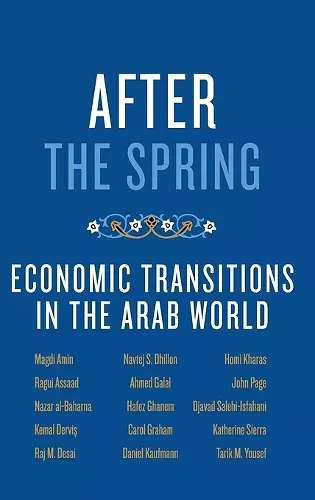After the Spring
Economic Transitions in the Arab World
Nazar al-Baharna author Ahmed Galal author Kemal Dervis author Ragui Assaad author Magdi Amin author Raj M Desai author Navtej S Dhillon author Hafez Ghanem author
Format:Hardback
Publisher:Oxford University Press Inc
Published:3rd May '12
Currently unavailable, currently targeted to be due back around 1st February 2025, but could change

The Arab Spring constitutes perhaps the most far-reaching political and economic transition since the end of communism in Europe. For too long, the economic aspirations of the people in the region, especially young people, have been ignored by leaders in Arab countries and abroad. Competing views as to how best to meet these aspirations are now being debated in the region. The outcome will shape Arab societies for generations to come. The authors of this book argue that significant economic reforms must accompany the major political transitions that are underway. Although each country has a different economic structure and history and must make its own way forward, there are spill-overs from trade and investment linkages, the contagion of news cycles, interaction of people and sharing of expectations that are too great to ignore. Some common foundation of the new Arab economies is needed. Towards that end, this volume addresses four central challenges of economic reform in the Arab world. First, with two-thirds of the population under the age of 30, the disproportionate burdens of unemployment and poor education can no longer be heaped on youth. Second, while some government policies may have improved the living standards of Arab citizens in the past, they have also entrenched cronies, enriched a small elite, and become unaffordable. Third, if Arab economies are to compete in the 21st century they cannot depend solely on oil and gas money, remittances, and tourism, but will require active, independent private sectors. And finally, the relative isolation of Arab economies--both from each other and from the world--must end. Rather than providing specific lists of recommendations, this book sets forth a set of guidelines and priorities for reformers who will begin creating new opportunities for youth, rebuilding the institutions of the state, diversifying the private sector, and cooperating with each other and integrating with the world economy.
Required reading. * Luke McDonagh, London School of Economics *
usefully outlines what is needed to rebuild a modern state ... [a] volume of sound research and analysis. * Maria Golia, Times Literary Supplement *
ISBN: 9780199924929
Dimensions: 155mm x 236mm x 20mm
Weight: 408g
190 pages